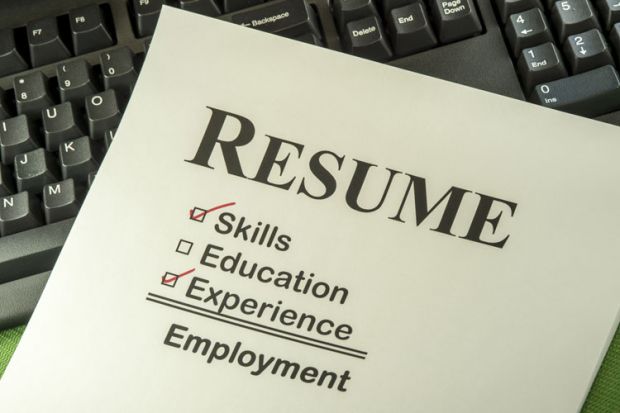When did you last take a close look at your CV? Is it online for others to peruse? And if so, is it up to date?
For academics, a strong profile can be of huge importance when demonstrating the impact of one’s work, or trying to land a speaking slot at a prestigious conference. However, tread carefully.
Just as researchers should regularly “garden” their online identities to ensure that they are not being incorrectly credited with work in a way that could damage their scholarly reputation, so they should also keep any online résumés neat and tidy. In an age of online scrutiny, any missteps or inaccuracies can result in uncomfortable questions.
Questions such as those asked in a Daily Mail article about Connie St Louis, the senior lecturer in journalism and director of City University London’s Science Journalism MA, who originally reported Nobel laureate Sir Tim Hunt’s now infamous “trouble with girls” remarks.
In the aftermath of the reports, attention was focused on the eminent scholar. He announced his resignation from an honorary professorship at University College London, the Royal Society, and the European Research Council, and scientists took to social media to poke fun at his remarks.
In the last fortnight, however, a growing number of higher profile figures have spoken out in defence of Sir Tim (rightly or wrongly), and some of the scrutiny online has shifted to Ms St Louis. The Mail piece raises a number of allegations about the City lecturer’s online profile.
Some are matters of interpretation. For example, Ms St Louis had claimed to have written a range of articles for national newspapers in a way that might suggest a more prolific output than seems to be the case.
Others are more puzzling: for example, Ms St Louis claimed, according to the Mail, to be a “member of the Royal Institution” – a seemingly prestigious position, until a spokesman for the RI told the newspaper that “anyone can be a member. It’s simply a service you pay for which entitles you to free tickets to visit us and gives you a discount in our café”.
In statements made today, both Ms St Louis and City University have clarified their position, with the university standing by the academic, and Ms St Louis accusing the Mail of “misleading” reporting.
"We have spoken to Connie and are satisfied that her academic qualifications are correct. We will be working with her to update her profile page to include more recent publications and professional activities,” a spokesman for the university said.
Ms St Louis said the Mail article amounted to an attempt to “discredit “ her. “A number of newspapers and broadcasters around the world, including the Daily Mail, reported the [original] story and quoted me.
“I consider that by reporting controversial comments by Sir Tim I was simply fulfilling my role as a science journalist,” she added.
The board of the Association of British Science Writers has also given its “full support” to Ms St Louis, saying “journalists need to be free to carry out their jobs without fear of personal attack”.
Whatever your view on the details of this case, it serves as a reminder for any scholar with a public profile about the level of scrutiny anyone could face in an age when so much detail is available online.
Is your LinkedIn profile up to date? Do you keep tabs on your Research Gate and Academia.edu profiles? If not, then this case suggests that it might be a good idea for you to start doing so.




